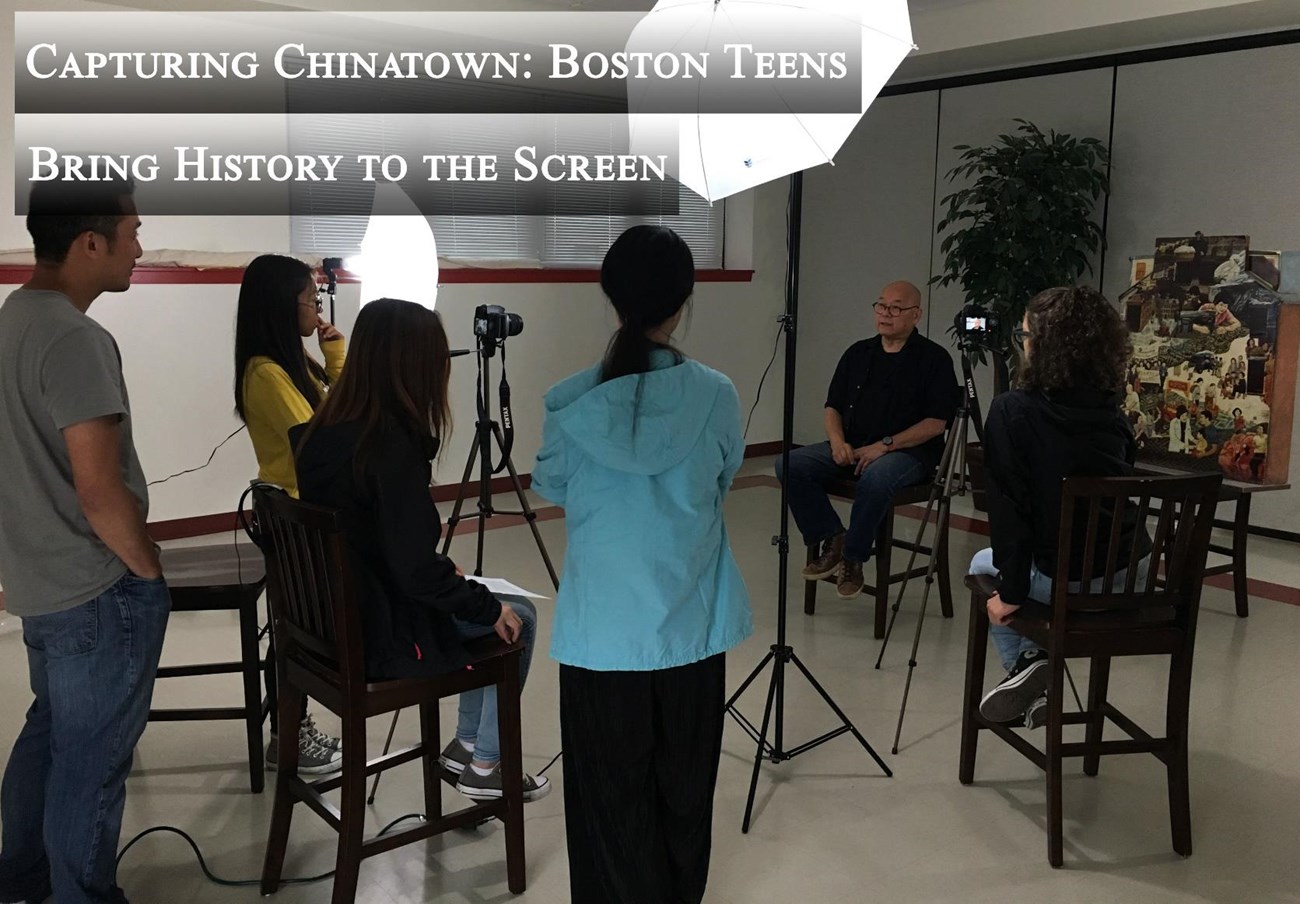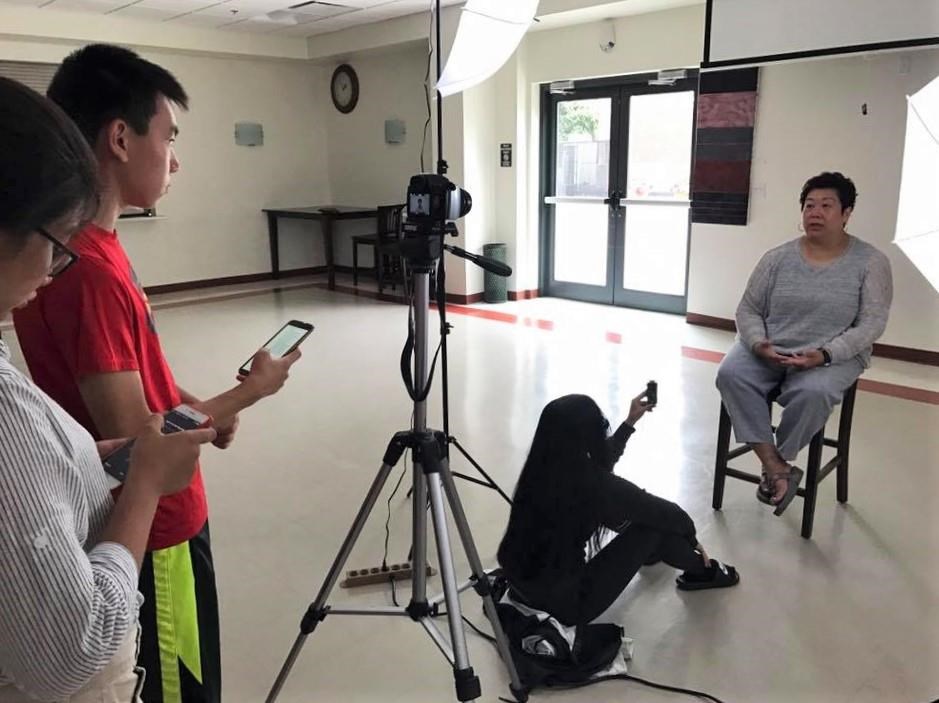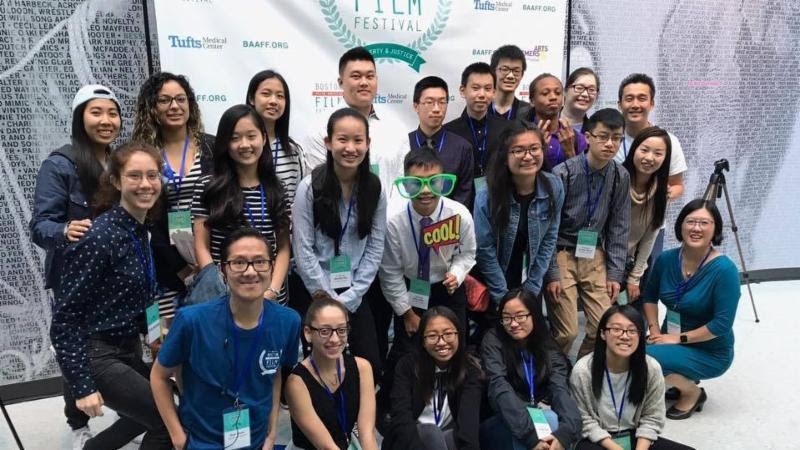Last updated: March 2, 2022
Article
Capturing Chinatown: Boston Teens Bring History to the Screen

By Margaret Gach
As the camera pans up the Josiah Quincy School in Boston’s Chinatown – the voice of Wing-kai To, vice president of the Chinese Historical Society of New England, explains the history of the oldest school building in the city.
“It was built primarily because the other schools at that time were not sufficient for the new populations coming into Boston,” To says. “At that time in the beginning, it was a way to assimilate immigrant students into Americans.”
The camerawork, interview and production are the result of a talented group of teenagers brought together by a summer-long history and digital storytelling program. The series of videos created for the Boston Chinatown Heritage Project tell the story of the people, places and moments that have made Chinatown the community it is.
In 2016 the historical society began working with the National Park Service – Rivers, Trails and Conservation Assistance program on several projects, including the Boston Chinatown Heritage Trail – an urban trail that will encourage people to get outside and explore the vibrant neighborhood. To help visitors learn more, Susan Chinsen, the former managing director of the Chinese Historical Society of New England, said the videos produced by the students will be integrated into the trail’s interpretive resources.
“I think the initial hesitation of trying to get involved with [the National Park Service] has been this thought that we were going to be told, ‘This is what you have to do or this is how you have to do it,’” Chinsen said. “But the reality was just the polar opposite. It was like they really helped make something possible that was very desirable from the community standpoint because they allowed it to be community-led.”
In the past, the Castle Square Tenants Organization, a nonprofit that supports affordable housing in Boston, had carried out several youth programs. With support from the National Park Service and the Chinese Historical Society of New England, the organization tailored the summer program towards the Boston Chinatown Heritage Trail. The 19 teens involved had the opportunity to learn about the area’s history and develop career skills.
Kelly Chen, one of the directors for the Josiah Quincy School video, said her experience in the 2017 summer program helped her understand the challenges Chinatown is facing today, including its shrinking population and borders.
“The purpose of this video is to help us understand different important aspects of Chinatown and how to tell people about it,” Chen said.

National Park Service project specialist, Charlie Tracy, helped design the summer-long project and assisted in connecting the students to other National Park Service resources across the city. Tracy believes one of the program’s most important impacts was helping the Castle Square Tenants Organization secure funding that provided five additional student stipends – making participation possible that summer.
“The Rivers, Trails and Conservation Assistance program has a unique position within the National Park Service: we know how to work with communities and how to bring in other National Park Service programs that are relevant to the community’s project goals,” Tracy said.
During the course of the summer, Tracy and April Antonellis, a National Park Service education specialist, planned field trips for the students to many of Boston’s National Park Service sites and programs. Students had the opportunity to visit the historic African Meeting House, Boston Harbor Islands National Recreation Area, and the Black Heritage Trail to see how different places told their own history.
"I think this project is a good example of how the National Park Service can be effective in the space between our urban National Parks and communities that surround them.” – Charlie Tracy
“We had a diverse group of youth, so we wanted to make sure that different youth in our program felt that their history was also highlighted and shared,” said Madi Mühlberg, the Castle Square Tenants Organization teen program and youth development manager. “That field trip was really to understand how heritage trails are designed and managed and why the work of the National Park Service is important. It also gave our team a look into different career options as a ranger or as a youth worker or even as public historians.”
The Chinese Historical Society of New England is still in the planning stages of the heritage trail, but the teen’s videos have already gotten exposure in the community. Chinsen, who helps run the annual Boston Asian American Film Festival, said the students and their mentor, filmmaker Kenneth Eng, watched their pieces play on the big screen and had a chance to interact with the audience. While the videos were great, Antonellis agreed with Tracy that seeing the youth engage with the program and the Chinatown community was the best part of the project.

“I think this project is a good example of how the National Park Service can be effective in the space between our urban National Parks and communities that surround them,” Tracy said. “Now the Chinatown community has a better feeling and connection with the Park Service.”
The National Park Service’s role in the Boston Chinatown Heritage Trail is winding down, but the energy from the students and all the project partners makes Tracy confident in its future.
“In the last year, the momentum is continuing to build: three grants totaling $350,000 were secured for implementation of wayfinder signs, a pilot exhibit and interpretive waysides,” Tracy said.
For the teens, including Elizabeth Figueroa, who created a video on Chinatown’s senior care, the impacts of their summer have lasted beyond the film festival.
“I have become more of a leader, leading kids and talking to them,” Figueroa said. “I have learned to create an amazing film to make people more aware of senior centers. And last but not least, [I’ve made] amazing friends.”
See the films created by the teens for the Boston Chinatown Heritage Trail project here.
